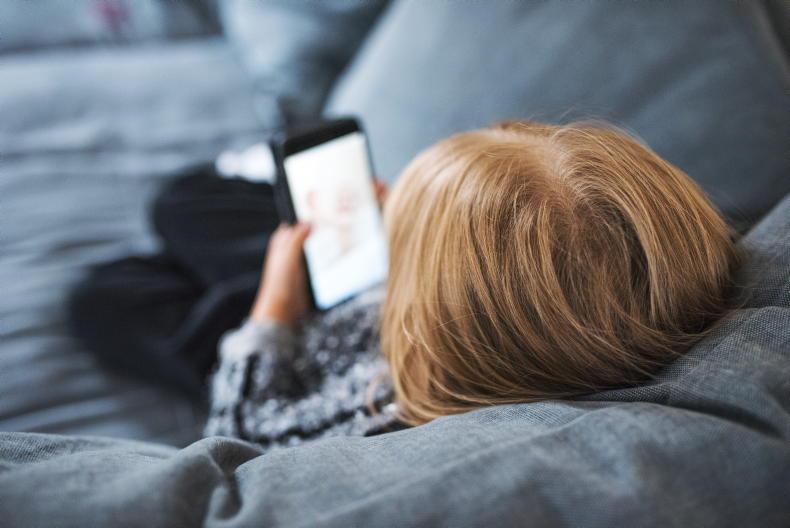With the number of smartphone users in Ireland estimated to reach 3.8 million by 2024, it’s not really a question of if but when your child will have one. What is the right age to buy your child their first smartphone?
My son was in second year and I actually encouraged him to get one in order to keep up with friends. My daughter badgered me and got one for her Confirmation, just before lockdown. She seemed ready; but I began to wonder when she promptly dropped it in the paddling pool.
“There is no ideal age,” says Jane McGarrigle, project officer from internet safety site Webwise.
“The right age will depend on the child’s maturity and families have different approaches to technology, so it’s up to the family to decide.”
“If your child shows very low levels of impulse control management, then you shouldn’t get them a phone at the same time as everybody else. As a rule of thumb, I’d always say first year should be the time that they get a phone,” says Richard Hogan, family psychotherapist and author of Parenting the Screenager. “At the very earliest, maybe their Confirmation [generally sixth class but can be fifth].”
Set solid boundaries
Smartphones are an intrinsic part of how our teenagers communicate now.
The parenting really begins when the phone arrives. “Once they take that phone into their hands, they take everything that the world has to offer, so we need to have really solid boundaries,” says Richard.
Involve everyone in the family in the conversation from the outset - it’s much harder to roll back when you hit a problem if there are no rules. Jane recommends setting rules on where, when and how smartphones can be used by making a Family Agreement with your child’s input. Cover what websites and apps can be visited, recommended times online and acceptable online behaviour.
“Modelling good behaviour and leading by example helps reinforce things and keeps everyone on the same page,” says Jane.
Smartphones are highly addictive – we can all attest to that. A child’s bedroom should be where they go to sleep, so introducing a “no phones in the bedroom” policy and switch-off time is really important from day one. Richard suggests an hour or two after dinner is the most they should be on their phone at any point. Phone use through the night is causing severe sleep deprivation in teens, impacting their mental wellbeing and affecting their performance in school the following day. If they say they need their phone in their room as an alarm, buy them an actual alarm clock!
Not all apps are suitable for children. Some appear to be “free” but actually have in-app costs and once children have a phone, they are open to scams. Parents are recommended to manage their child’s internet access, approve or block any apps and secure their privacy settings (see webwise.ie for details on how to do this).
Richard recommends explaining the following to your child: “[Tell them], we will be a presence in that conversation, not intrusively, but we will be there. Research shows us the more involved we are the less risky behaviour children get involved in.”
Risk awareness
What risks should parents be aware of?
“Isolation and rejection are probably the most profound things that teenagers experience,” Richard replies. Many apps show location, so if a group are meeting up it’s very easy to feel excluded, whether it’s unintentional or otherwise.
Cyberbullying and being subtly targeted or alienated by groups is another big issue.
“Girls are very good at this. They might exclude somebody from a group or kick somebody off a group,” Richard says. “That’s terrible for a young person’s development.”
Owning a mobile too young can affect academic performance, according to research by Economic and Social Research Institute (ESRI) published in 2019. Children who owned a mobile phone at age nine scored 4% less on average in standardised reading and maths tests at age 13.
“Your child will consume pornography whether that’s intentionally or otherwise,” Richard says, with sexting another huge concern. Young people are being asked for intimate images that can then be shared indiscriminately. Set aside time to talk to your teen about the idea of consent and respect online, making sure they are familiar with the legal implications of Coco’s Law and the Child Pornography Act.
“Reinforce messages that it’s ok to say no and it’s ok to hear no,” says Jane.
Connection
Awareness of the risks and issues with smartphones shouldn’t scare parents from allowing children to own a phone, however. Smartphones connect our children and especially through lockdown allowed them to keep up with their friends and support each other in chat groups. Some apps open up new educational opportunities to your child.
Smartphones can provide your child with more independence because they can be readily contactable when out shopping or at an event.
“Smartphones are here to stay and are going to get more sophisticated,” says Richard. “We have to shapeshift with it.”
We might feel outpaced by technology, daunted even, but we can’t and shouldn’t avoid our integral role in our child’s first venture into smartphone ownership. Richard ends with words of encouragement: “Parents should feel empowered. It’s powerful but we can manage it.”
Ask
yourself
Is my child responsible? Will they be able to stick
to the guidelines? Do they understand actions
and consequences?Would they come to a trusted adult if something happened?
Read more
Parenting: panic at the teen disco
Parenting: talking cents this Christmas
With the number of smartphone users in Ireland estimated to reach 3.8 million by 2024, it’s not really a question of if but when your child will have one. What is the right age to buy your child their first smartphone?
My son was in second year and I actually encouraged him to get one in order to keep up with friends. My daughter badgered me and got one for her Confirmation, just before lockdown. She seemed ready; but I began to wonder when she promptly dropped it in the paddling pool.
“There is no ideal age,” says Jane McGarrigle, project officer from internet safety site Webwise.
“The right age will depend on the child’s maturity and families have different approaches to technology, so it’s up to the family to decide.”
“If your child shows very low levels of impulse control management, then you shouldn’t get them a phone at the same time as everybody else. As a rule of thumb, I’d always say first year should be the time that they get a phone,” says Richard Hogan, family psychotherapist and author of Parenting the Screenager. “At the very earliest, maybe their Confirmation [generally sixth class but can be fifth].”
Set solid boundaries
Smartphones are an intrinsic part of how our teenagers communicate now.
The parenting really begins when the phone arrives. “Once they take that phone into their hands, they take everything that the world has to offer, so we need to have really solid boundaries,” says Richard.
Involve everyone in the family in the conversation from the outset - it’s much harder to roll back when you hit a problem if there are no rules. Jane recommends setting rules on where, when and how smartphones can be used by making a Family Agreement with your child’s input. Cover what websites and apps can be visited, recommended times online and acceptable online behaviour.
“Modelling good behaviour and leading by example helps reinforce things and keeps everyone on the same page,” says Jane.
Smartphones are highly addictive – we can all attest to that. A child’s bedroom should be where they go to sleep, so introducing a “no phones in the bedroom” policy and switch-off time is really important from day one. Richard suggests an hour or two after dinner is the most they should be on their phone at any point. Phone use through the night is causing severe sleep deprivation in teens, impacting their mental wellbeing and affecting their performance in school the following day. If they say they need their phone in their room as an alarm, buy them an actual alarm clock!
Not all apps are suitable for children. Some appear to be “free” but actually have in-app costs and once children have a phone, they are open to scams. Parents are recommended to manage their child’s internet access, approve or block any apps and secure their privacy settings (see webwise.ie for details on how to do this).
Richard recommends explaining the following to your child: “[Tell them], we will be a presence in that conversation, not intrusively, but we will be there. Research shows us the more involved we are the less risky behaviour children get involved in.”
Risk awareness
What risks should parents be aware of?
“Isolation and rejection are probably the most profound things that teenagers experience,” Richard replies. Many apps show location, so if a group are meeting up it’s very easy to feel excluded, whether it’s unintentional or otherwise.
Cyberbullying and being subtly targeted or alienated by groups is another big issue.
“Girls are very good at this. They might exclude somebody from a group or kick somebody off a group,” Richard says. “That’s terrible for a young person’s development.”
Owning a mobile too young can affect academic performance, according to research by Economic and Social Research Institute (ESRI) published in 2019. Children who owned a mobile phone at age nine scored 4% less on average in standardised reading and maths tests at age 13.
“Your child will consume pornography whether that’s intentionally or otherwise,” Richard says, with sexting another huge concern. Young people are being asked for intimate images that can then be shared indiscriminately. Set aside time to talk to your teen about the idea of consent and respect online, making sure they are familiar with the legal implications of Coco’s Law and the Child Pornography Act.
“Reinforce messages that it’s ok to say no and it’s ok to hear no,” says Jane.
Connection
Awareness of the risks and issues with smartphones shouldn’t scare parents from allowing children to own a phone, however. Smartphones connect our children and especially through lockdown allowed them to keep up with their friends and support each other in chat groups. Some apps open up new educational opportunities to your child.
Smartphones can provide your child with more independence because they can be readily contactable when out shopping or at an event.
“Smartphones are here to stay and are going to get more sophisticated,” says Richard. “We have to shapeshift with it.”
We might feel outpaced by technology, daunted even, but we can’t and shouldn’t avoid our integral role in our child’s first venture into smartphone ownership. Richard ends with words of encouragement: “Parents should feel empowered. It’s powerful but we can manage it.”
Ask
yourself
Is my child responsible? Will they be able to stick
to the guidelines? Do they understand actions
and consequences?Would they come to a trusted adult if something happened?
Read more
Parenting: panic at the teen disco
Parenting: talking cents this Christmas









SHARING OPTIONS